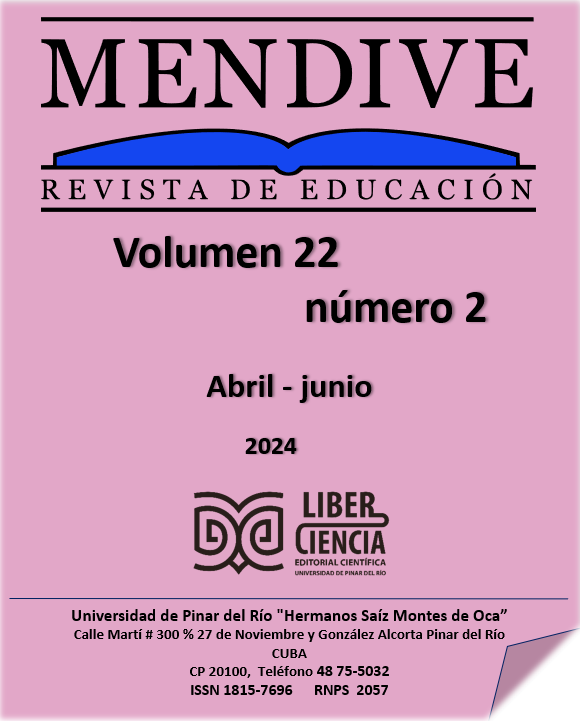Didactic strategy to improve the teaching-learning process of translation
Main Article Content
Abstract
This article shows the main results of a doctoral research that focuses on the eradication of deficiencies that affect the teaching of translation in the Faculty of Spanish for Non-Spanish Speakers of the University of Havana. The objective is to present a didactic strategy, based on the task-based approach, for the improvement of the teaching-learning process of translation as a dynamic agent in the training of the future translator. The dialectical-materialist method was used as a general method, as well as methods of the theoretical level: the historical-logical, induction-deduction and analysis-synthesis. At the empirical level, the review of documents, the survey, the interview, the pedagogical test, the pre-experiment and expert consultation were used. The strategy is made up of theoretical foundations, principles and premises, characteristics, stages and a methodology in which the previous components are specified as a guide to the translation teaching-learning process towards its improvement. Methodological workshops were held to insert the work of the rest of the disciplines of the degree as support in the implementation of the strategy. The results obtained so far corroborated the effectiveness of the proposal, adding that it was possible to create a contract that allows students to carry out their preprofessional practices in the Translators and Interpreters Services Team of Cuba. The progress made exposed the real possibility of achieving higher levels of mastery of translation skills in students as future promoters of dialogue between cultures and nations.
Downloads
Article Details

This work is licensed under a Creative Commons Attribution-NonCommercial 4.0 International License.
References
Cerezo Herrero, E. (2020). La didáctica de lenguas extranjeras en los estudios de Traducción e Interpretación: ¿qué nos dice la investigación? Hermçneus. Revista de Traducción e Interpretación, 22 (2020): 41-73. DOI: https://doi.org/10.24197/her.22.2020.41-73
Galán Mañas, A. (2007). La enseñanza por competencias, por tareas y por objetivos de aprendizaje: el caso de la traducción jurídica portugués-español. Íkala, revista de lenguaje y cultura, 12(18), 27-57. Universidad de Antioquia. Medellín, Colombia. http://www.redalyc.org/articulo.oa?id=255020488002
González Matute, A. (2023). La formación de competencias de traducción en estudiantes sinohablantes: una vía para el entendimiento entre culturas y naciones. Estudios del Desarrollo Social: Cuba y América Latina, 11(2), 289-301. http://revistas.uh.cu/revflacso/article/view/4432
Hurtado Albir, A. (2019). La investigación en didáctica de la traducción. Evolución, enfoques y perspectivas. En: Tolosa Igualada, Miguel y Álvaro Echeverri (eds.) (2019). Porque algo tiene que cambiar. La formación de traductores e intérpretes: Presente y futuro. MonTI, 11, 47-76. http://dx.doi.org/10.6035/MonTI.2019.11.2
Hurtado Albir, A.; Kuznik, A. y Rodríguez-Inés, P. (2022). La competencia traductora y su adquisición. En: Hurtado Albir, A. y Rodríguez, I., P. (eds.) 2022. Hacia un marco europeo de niveles de competencias en traducción. El proyecto NACT del grupo PACTE. The PACTE group's NACT project. MonTI Special Issue 7, pp. 19-40. https://dx.doi.org/10.6035/MonTI.2022.ne7.02
Kelly, D. y Horcas, S. (2020). Inverse (A-B/C) translation education in Spain under the EHEA, Perspectives, 28(2), 300-319. https://doi.org/10.1080/0907676X.2019.1684529
López, R. G. (2004). Sobre didáctica de la traducción. Meta, 49(2), 432-446. https://doi.org/10.7202/009368ar
Méndez Caballero, Y. (2022). El enfoque por tareas: de la enseñanza de lenguas a la formación de traductores. Revista Universidad y Sociedad, 14(3), 85-93. https://rus.ucf.edu.cu/index.php/rus/article/view/2845
Trovato, G. (2020). Una aproximación a un modelo de evaluación para la mediación lingüística en la enseñanza del español como lengua extranjera (ELE)1. Tonos Digital, 39(II) http://www.tonosdigital.com/ojs/index.php/tonos/article/view/2577/1179
Valle, A. (2010). La Investigación Pedagógica. Otra Mirada. La Habana, Cuba: Editorial Pueblo y Educación.
Varona Domínguez, F. (2021). La formación universitaria integradora y activa: características básicas. Revista Cubana de Educación Superior, 4(2), http://scielo.sld.cu/scielo.php?script=sci_arttext&pid=S025743142021000200003&lng=es&tlng=es
Vega Romero, M., Páez Pérez, V. I. y Márquez Escudero, G. (2021). Las tareas integradoras en el proceso de desarrollo de la competencia traductora en la formación de traductores e intérpretes. LUZ, 20(2), 6-15. https://luz.uho.edu.cu/index.php/luz/article/view/1112
Weinberg Alarcón, J. y Maondaca Becerra, L. (2019). ¿Cómo transitar en el aula para adquirir la competencia traductora? Del aprendizaje por tareas al aprendizaje basado en proyectos. Mutatis Mutandis. Revista Latinoamericana de Traducción, 12(1), 126-155. https://doi.org/10.27533/udea.mut.v12n1a05


